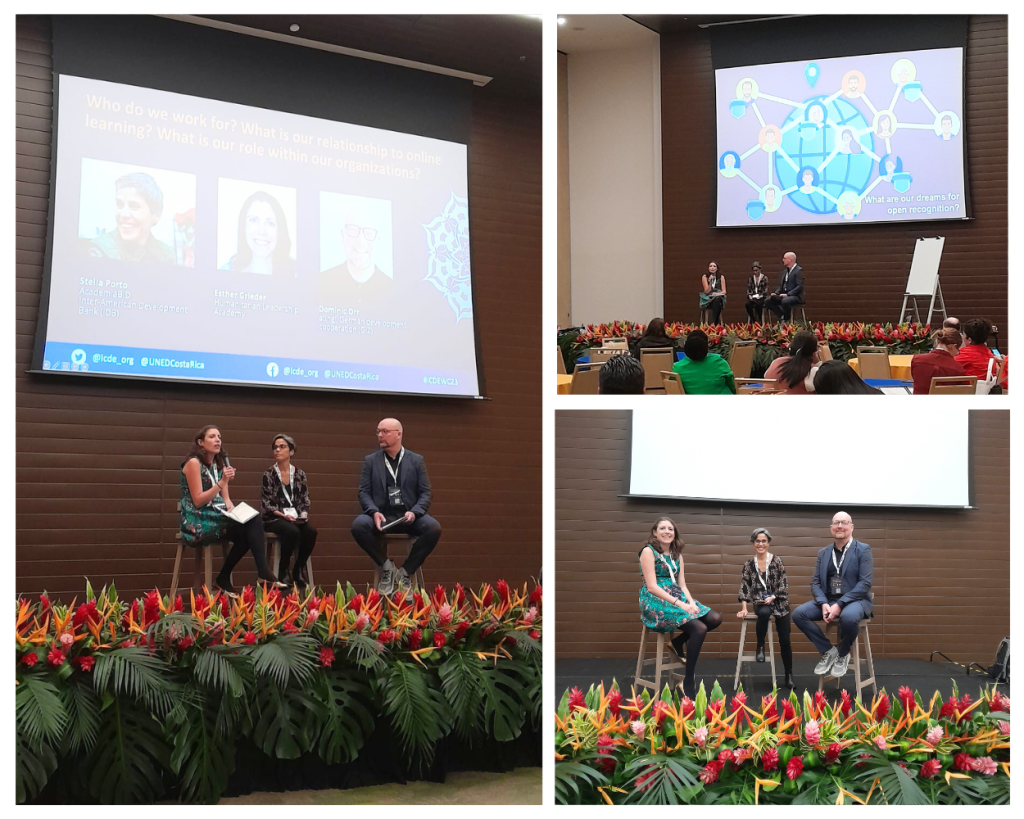21st November 2023
Earlier this month, I was incredibly lucky to be able to attend the International Conference on Open and Distance Education (ICDE) in San Jose, Costa Rica. Here I share my reflections on the big themes of the conference, as well as the panel in which I participated.

Our panel: Whose skills do we recognise and why?
Along with Stella Porto from the IDB and Dominic Orr from GIZ / atingi.org, I was at ICDE to talk about ‘open recognition’, a mini-movement which aims to acknowledge that we learn in many different ways throughout our lives, and that there is a society-wide need to broaden the range of the skills and experience we value and formally recognise.
If this sounds vague, the humanitarian sector provides an excellent illustration.
Arguably the most valuable humanitarian work is done by first-line responders in crisis-affected communities, the very same people that are least likely to be recognised in any formal way for their skills and expertise.
Whilst 90 percent of humanitarian workers in crisis-affected areas are nationals (ALNAP, SOHP, 2022), these are not the people that predominantly receive recognition, either to support career goals and future employment, or in the media.
As in many areas of work, there is a very real question in the humanitarian sector about whose skills we value and why.
During our panel, Stella, Dominic and I shared why open recognition is important for each of our respective sectors, the challenges we have faced in implementing it in practice, and what has worked well so far.
In relation to the humanitarian sector, I shared three long term dreams for what open recognition might achieve:
1. Recognition of the valuable knowledge and experience frontline humanitarians gain through action and practical work.
As mentioned, 90 percent of humanitarians in crisis-affected areas are nationals (ALNAP 2022). No amount of academic study can substitute for practical skills and characteristics required to respond in crisis, but these skills are largely unrecognised.
2. In an innately fast-changing sector where people are constantly required to learn and adapt, promotion and recognition of commitment to lifelong learning.
3. The ability to easily access verifiable evidence of a person’s skills and experience, enabling them to be quickly deployed into the right role in a crisis, minimising paperwork and the requirement to duplicate training.
At the HLA, we are committed to working towards these dreams, across our work and particularly through our HPass platform (find out more below).
The wider conference: How do we keep up with an accelerating pace of change?
During the wider conference it was fascinating to hear from a cross section of open and distance learning aficionados, and note the many parallels between the challenges faced by higher education, and humanitarian learning. For example:
- Recognising that new technologies and AI are game-changers for lifestyles and labour, how do we ensure we have sufficient digital understanding in our organisations to make effective decisions about tech? And how do we build staff and learner digital literacy?
- How do we combat institutional inertia and ensure our organisations can continuously adapt to meet learners’ needs? What roles should more traditional institutions take on within the ecosystem, and what new competencies do we need from leaders to provide inspiration and direction in times of change? This is a huge agenda in the humanitarian sector, with increasing numbers of more protracted crises in recent years, and a proportionally shrinking budget.
- How can we ensure that we maintain and cultivate human connection in a digital world, for example in terms of facilitating social learning and networking, and looking after learner and staff mental health? How do we focus on the increasing importance of cognitive and interpersonal skills as technical tasks become automated?
Given the topic of our own panel, it was interesting for me to note that micro-credentials and open recognition were a huge theme across the conference, pointing to the implementation of more flexible, tailored learning as a key response by higher education to a world in which the labour market and its skills requirements are changing fast.
In any case, it is reassuring to remember that both the open and distance education and humanitarian learning communities are founded on the principle that educational approaches need to be continuously adapted to keep learning relevant and accessible to all. Evolving to meet needs is what our sectors are good at, and it was great to be among so many people who are passionate about that, and ready to rise to these new challenges.
Big thank you to Stella Porto and the IDB for sponsoring my attendance at the conference.
Find out more
Esther attended the ICDE World Conference 2023 in San José, Costa Rica between 6-10 November. Esther’s attendance was made possible thanks to the generous support of the Inter-American Development Bank.
To find out more about HLA’s skills recognition work, visit our HPass platform. Create your own account, then click ‘Explore’ to view digital credentials you can earn.
You can contact the HPass team on info@hpass.org
